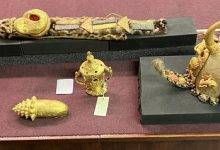
The African Challenge, a non-governmental organisation, has called for a temporary ban on salt mining by Seven Seas Industries at Adina in the Ketu South Municipality until all outstanding issues have been addressed.
The issues, according to the NGO, include displacement of local salt miners at the Ketu-Keta Lagoon area, lack of compensation for the people affected by Seven Seas Industries and the drawing of underground water for salt production by the mining company instead of sea water.
John Adza, the Director of African Challenge made the call at a policy dialogue on Artisanal and Small-Scale Salt and Gold Mining in Ghana in Accra on Tuesday.
Under the auspices of Star Ghana, the programme was organised by Third Network (TWN) Africa, to discuss the outcome of national and regional meetings organised by the TWN Africa on Artisanal and Small-Scale Salt Mining in the country.
Mr Adza alleged that the operations of Seven Seas Industries had displaced about 60,000 local salt miners in the Ketu South of which 80 per cent are women.
The Director also said the company was drawing underground water for its salt production instead of sea water, which was in contravention of the agreement the company signed with government.
“The drawing of underground water by Seven Seas Industries is causing the Ketu-Keta Lagoon to dry up and causing coconut trees along the lagoon to wither,” he said, adding that the livelihoods of the people living along the Ketu-Keta lagoon were being hampered during the drying up of the lagoon.
The Executive Director of TWN-Africa, Dr Yao Graham in a presentation said Ghana was the biggest producer of salt in West Africa with the bulk of output coming from the Artisanal Small-Scale salt mining sector.
He said even though the salt industry offered immense opportunity for job creation and poverty reduction, much attention was not being given to the sector as it was done for gold.
“Unlike gold, a much sought-after high value mineral, state interest in and institutional support for salt production is relatively weak,” he said.
Dr Graham called for comprehensive strategy and a master plan on salt mining for the country, which would benefit both industrial and local salt producers.
On gold mining, the CEO of TWN-Africa said the attention given to large-scale mining companies should also be given the small-scale mining industry.
According to Dr Graham small-scale gold mining contributed more than a third of officially recorded gold production and employed more people than the large-scale mining sector.
He called for comprehensive approach and model in tackling illegal mining instead of what he described as the “militarised approach in dealing with the problem.”
The Advisor on Mining at the Ministry of Lands and Natural Resources, Ben Aryee in his remarks said there was the need for the country to look for cheaper means of salt production to be able to compete in the global salt industry.
Touching on small-scale gold production, he said the sector remained at the heart of the government and would continue to support the sector to thrive.
He said the Multi-sectoral Mining Integrated Project was being implemented to provide to address the concerns of the players in the sector and provide alternative sources of livelihoods to people affected by the ban on illegal mining.
By Kingsley Asare







